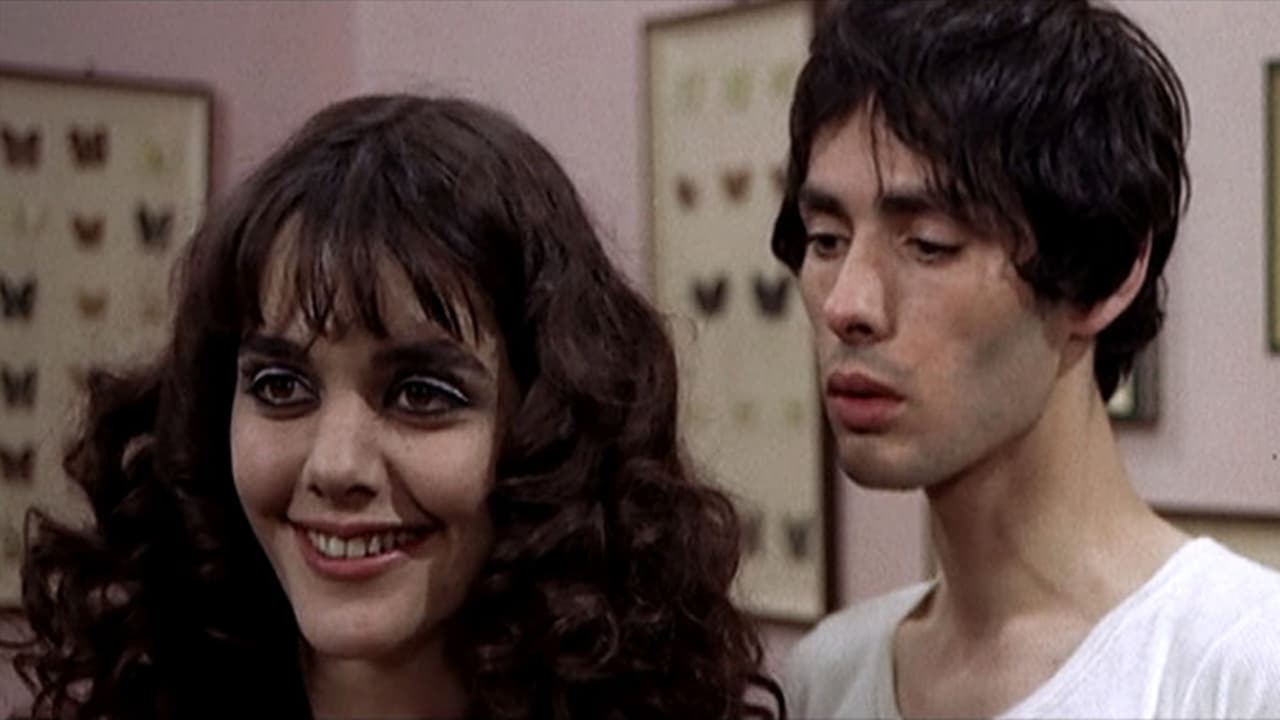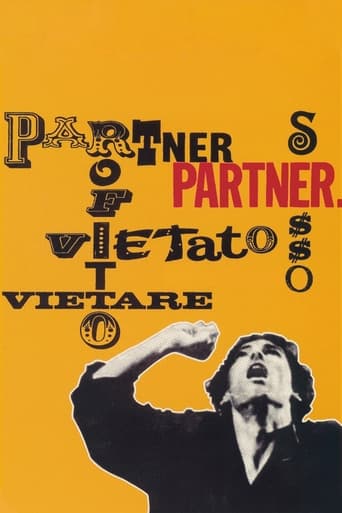



Brilliant and touching
A Disappointing Continuation
This is one of the few movies I've ever seen where the whole audience broke into spontaneous, loud applause a third of the way in.
View MoreI didn’t really have many expectations going into the movie (good or bad), but I actually really enjoyed it. I really liked the characters and the banter between them.
View MoreIt's not easy to rate an experimental film on the same scale as films that were intended to be seen by wider commercial audiences, and "Partner" is an experimental film. Many have criticized Bertolucci for aping Godard's style in this film, and certainly there are liberal elements of "Two Or Three Things I Know About Her" and "Weekend," but the camera work and cinematography and even the Morricone score are all indicative of an Italian filmmaker, more so than the French new wave that served as the defacto inspiration. But if one is forced to point out the films that it followed, one should also illuminate the many films that it inspired, whether directly or indirectly, and that list is at least as impressive. The easy heir is "Fade To Black," which follows a would-be actor on his descent into madness and murder. The over-the-top performance of Pierre Clementi is exchanged (perhaps as a sign of the times) for the understated twitchiness of Dennis Christopher, but the whole story is here. One can chose to credit the original Dostoyevsky story, but the film reference reads truer as an influence on the later film when considering what a lose adaptation "Partner" was of "The Double." In fact, Conrad's "The Secret Sharer" could just as easily have served as the source material when dissected the faithfulness of the Amico script of the Russian author's work (and of course only for the sake of argument, as Dostoyevsky is clearly credited). Less obvious may be the impact that Partner had on Bertolucci's Italian peers. A mere year later, "Love And Anger" would unite the Italian filmeratti with Godard to launch a collaborative New Wave film. It's unlikely this would have happened were it not for the release of "Partner." Likewise, the classroom discussions of "Zabriskie Point" betray more in common with this film than with Antonioni's previous output, and yet it can also be said that certain scene compositions in "Partner" could trace their routes back to Antonioni's "Blow Up." The composition is very similar though the camera movement is not. Even when examining Bertolucci's future output, one can point to Partner as the turning point in his artistic style. Up to that point his work was devoid of the cinema reference that pervades "Partner" (the Odessa steps parody, amongst others) and was toned down in "The Conformist" and "Last Tango In Paris." As an experiment, Partner is more of a success than a failure. It's not simple, casual viewing. It's a hard to digest film from a man who has absorbed and digested more about film than most others. It's comparable to Louis Malle's "Black Moon," but predates it by seven years. "Partner" is an oddity. It's unlikely to have a broad appeal, which is probably a good thing. This isn't going to sway the "Shrek" crowd, that's for sure. To an extent, you either get this film or you don't. The same can be said for dozens of films and filmmakers who are held in high regard by people who hold this film in contempt (it's tonally very close to Jodorowski's "Santa Sangre"). I for one am glad I've seen it. It's not perfect, but it's thought provoking, well made and less self indulgent than a lot of recent art-house fare from culty sacred cows ("Inland Empire," anyone?). Most people will find their way to this film as part of their Bertolucci completism. Some may be Tina Aumont obsessed. I don't think either will be greatly disappointed.
View MoreI was at Amoeba Music(A Hollywood Record Shop) the other day with my roommate and I had found this in the used section and it seemed interesting. I had never heard of it before and I didn't have the cash to buy it, but my roommate did, and bought it instead. I think this was one of the best films I've ever seen. The story is apparently an adaptation of a Dostoevsky story called "The Double",(which I've never read), the film is about a young Theater professor in the sixties, who begins losing his mind, and seeing an identical version of himself who begins giving him orders, egging him on to commit acts of terrorism, murder, and just generally insane things. It precedes Fight Club by thirty years. A remarkable film, from a great director in his own right, before Last Tango In Paris, there was Partner. A funny, smart, riot of a film, that creates tension and absurd explosion with the same grace, conjoined like deformed twins at the hip.
View MoreThis rather ludicrous exchange takes place at the end of David Lean's adaptation of Boris Pasternak's epic novel DR. ZHIVAGO:Gen. Yevgraf Zhivago: Tonya, can you play the balalaika?Tonya's Boyfriend: Can she play? She's an artist!This dialogue, as well as the scene within the framing device of Yuri Zhivago's brother Yevgraf finding Yuri's love child with Lara and telling her about her "past," appears nowhere in the novel. Instead, in an epilogue in the novel, two of the many characters, after the end of the Great Patriotic War (World War II), talk about how one had met this love child at the front. Their ruminations illustrate the great dislocations caused by the Revolution, Stalin's Terror, and the War. Nowhere does something as silly and trivial as the question "Can you play the balalaika?" appear in the novel.Movies that use great events as backdrops to personal stories tend to trivialize the great events and make the intimate lives of their characters rather absurd and trivial (ironically, the very charge Strelnikov makes to Zhivago, in reference to his poetry, in Lean's movie). Great events such as revolutions wash over everyone and have to be handled with the greatest care to avoid this fundamental absurdity of the events being greater than the individuals.Before "The Dreamers," Bertolucci already made his film that ruminates on the events of '68 and its aftermath in the year itself:"Partner" ("Il Sosia"), based on Dostoyevsky's "The Double." It is very interesting, and very honest, look at the spirit of the times and I highly recommend it.
View MoreMovie making is a form of expression that has in recent years been subject to a mold of narrative. The Partner is a genuine example of a film that does not comform to the standard. As always Bertolucci was able to draw performances that transform t characters he created into tangable moments. Particularly remarkable is Pierre Clementi's performance of a man with two identities. Made at the early age of 22, this film is a window into an artist mind. Open your mind and just allow yourself to enjoy the ride.
View More